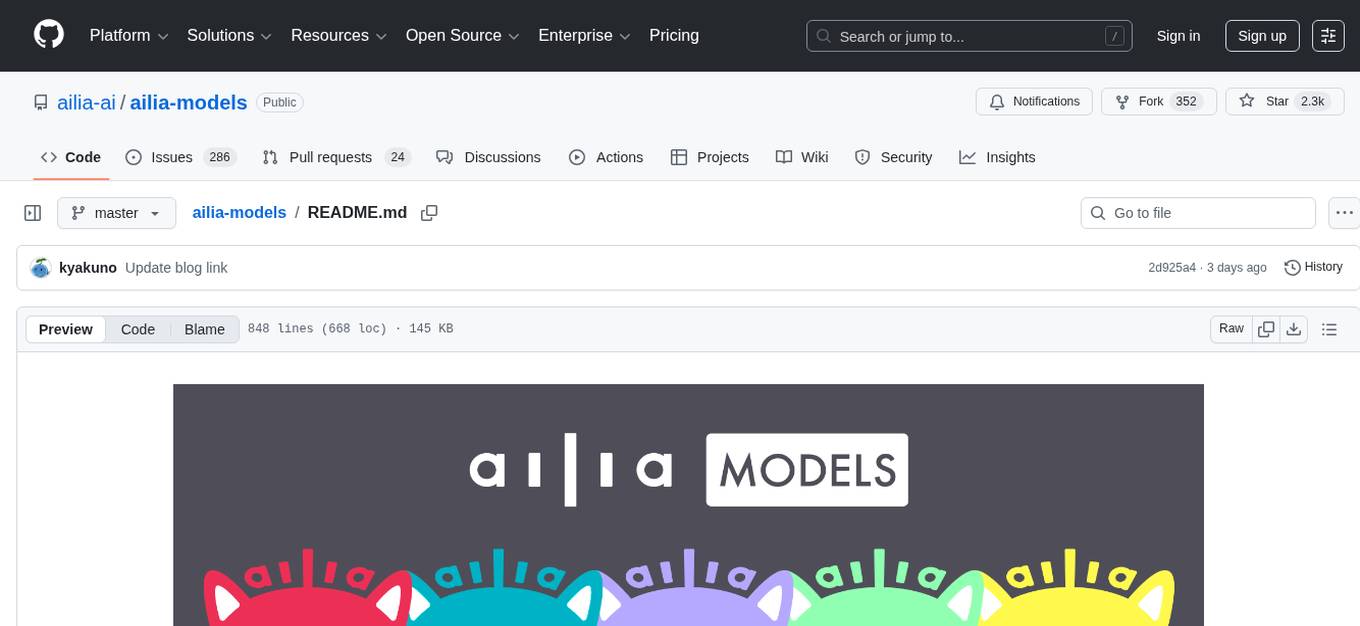
LLamaTuner
Easy and Efficient Finetuning LLMs. (Supported LLama, LLama2, LLama3, Qwen, Baichuan, GLM , Falcon) 大模型高效量化训练+部署.
Stars: 586
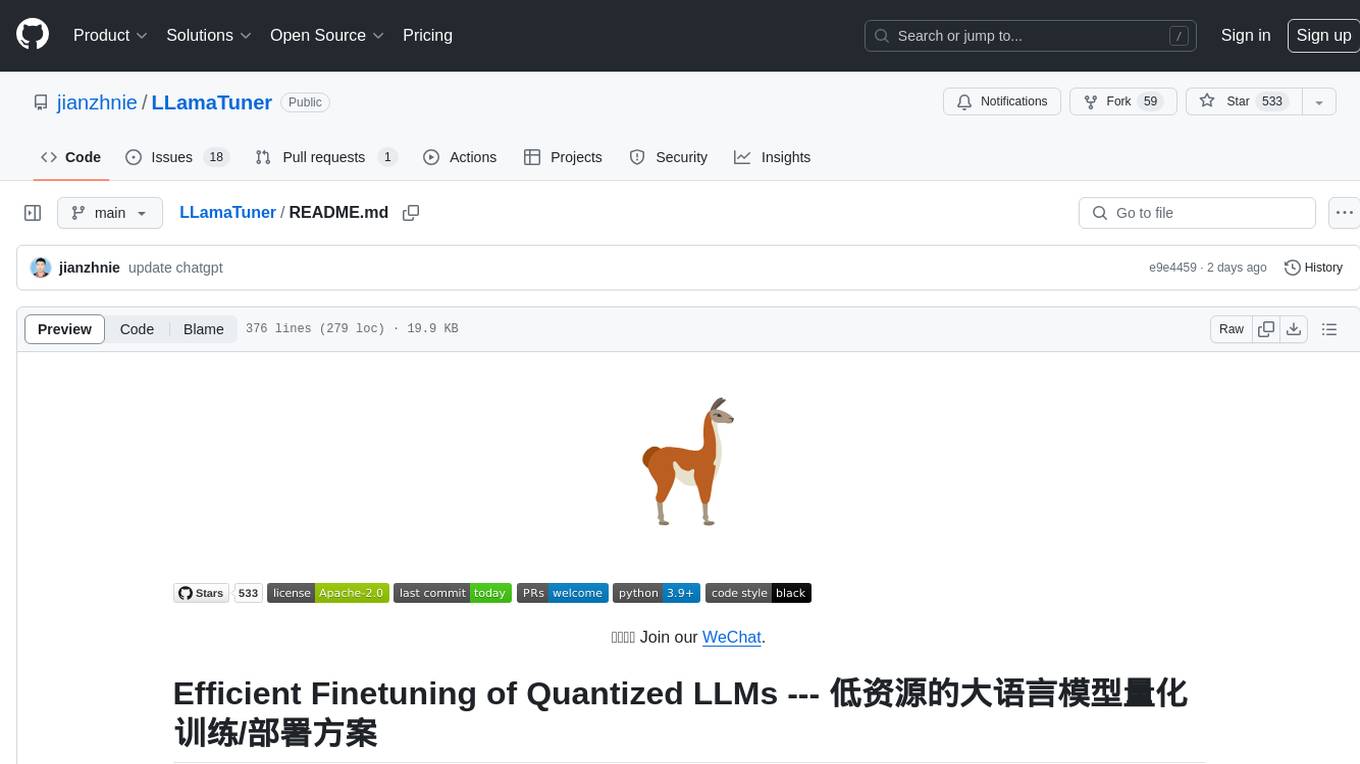
LLamaTuner is a repository for the Efficient Finetuning of Quantized LLMs project, focusing on building and sharing instruction-following Chinese baichuan-7b/LLaMA/Pythia/GLM model tuning methods. The project enables training on a single Nvidia RTX-2080TI and RTX-3090 for multi-round chatbot training. It utilizes bitsandbytes for quantization and is integrated with Huggingface's PEFT and transformers libraries. The repository supports various models, training approaches, and datasets for supervised fine-tuning, LoRA, QLoRA, and more. It also provides tools for data preprocessing and offers models in the Hugging Face model hub for inference and finetuning. The project is licensed under Apache 2.0 and acknowledges contributions from various open-source contributors.
README:
👋🤗🤗👋 Join our WeChat.
中文 | English
LLamaTuner is an efficient, flexible and full-featured toolkit for fine-tuning LLM (Llama3, Phi3, Qwen, Mistral, ...)
Efficient
- Support LLM, VLM pre-training / fine-tuning on almost all GPUs. LLamaTuner is capable of fine-tuning 7B LLM on a single 8GB GPU, as well as multi-node fine-tuning of models exceeding 70B.
- Automatically dispatch high-performance operators such as FlashAttention and Triton kernels to increase training throughput.
- Compatible with DeepSpeed 🚀, easily utilizing a variety of ZeRO optimization techniques.
Flexible
- Support various LLMs (Llama 3, Mixtral, Llama 2, ChatGLM, Qwen, Baichuan, ...).
- Support VLM (LLaVA).
- Well-designed data pipeline, accommodating datasets in any format, including but not limited to open-source and custom formats.
- Support various training algorithms (QLoRA, LoRA, full-parameter fune-tune), allowing users to choose the most suitable solution for their requirements.
Full-featured
- Support continuous pre-training, instruction fine-tuning, and agent fine-tuning.
- Support chatting with large models with pre-defined templates.
| Model | Model size | Default module | Template |
|---|---|---|---|
| Baichuan | 7B/13B | W_pack | baichuan |
| Baichuan2 | 7B/13B | W_pack | baichuan2 |
| BLOOM | 560M/1.1B/1.7B/3B/7.1B/176B | query_key_value | - |
| BLOOMZ | 560M/1.1B/1.7B/3B/7.1B/176B | query_key_value | - |
| ChatGLM3 | 6B | query_key_value | chatglm3 |
| Command-R | 35B/104B | q_proj,v_proj | cohere |
| DeepSeek (MoE) | 7B/16B/67B/236B | q_proj,v_proj | deepseek |
| Falcon | 7B/11B/40B/180B | query_key_value | falcon |
| Gemma/CodeGemma | 2B/7B | q_proj,v_proj | gemma |
| InternLM2 | 7B/20B | wqkv | intern2 |
| LLaMA | 7B/13B/33B/65B | q_proj,v_proj | - |
| LLaMA-2 | 7B/13B/70B | q_proj,v_proj | llama2 |
| LLaMA-3 | 8B/70B | q_proj,v_proj | llama3 |
| LLaVA-1.5 | 7B/13B | q_proj,v_proj | vicuna |
| Mistral/Mixtral | 7B/8x7B/8x22B | q_proj,v_proj | mistral |
| OLMo | 1B/7B | q_proj,v_proj | - |
| PaliGemma | 3B | q_proj,v_proj | gemma |
| Phi-1.5/2 | 1.3B/2.7B | q_proj,v_proj | - |
| Phi-3 | 3.8B | qkv_proj | phi |
| Qwen | 1.8B/7B/14B/72B | c_attn | qwen |
| Qwen1.5 (Code/MoE) | 0.5B/1.8B/4B/7B/14B/32B/72B/110B | q_proj,v_proj | qwen |
| StarCoder2 | 3B/7B/15B | q_proj,v_proj | - |
| XVERSE | 7B/13B/65B | q_proj,v_proj | xverse |
| Yi (1/1.5) | 6B/9B/34B | q_proj,v_proj | yi |
| Yi-VL | 6B/34B | q_proj,v_proj | yi_vl |
| Yuan | 2B/51B/102B | q_proj,v_proj | yuan |
| Approach | Full-tuning | Freeze-tuning | LoRA | QLoRA |
|---|---|---|---|---|
| Pre-Training | ✅ | ✅ | ✅ | ✅ |
| Supervised Fine-Tuning | ✅ | ✅ | ✅ | ✅ |
| Reward Modeling | ✅ | ✅ | ✅ | ✅ |
| PPO Training | ✅ | ✅ | ✅ | ✅ |
| DPO Training | ✅ | ✅ | ✅ | ✅ |
| KTO Training | ✅ | ✅ | ✅ | ✅ |
| ORPO Training | ✅ | ✅ | ✅ | ✅ |
As of now, we support the following datasets, most of which are all available in the Hugging Face datasets library.
Supervised fine-tuning dataset
- Stanford Alpaca
- Stanford Alpaca (Chinese)
- Hello-SimpleAI/HC3
- BELLE 2M (zh)
- BELLE 1M (zh)
- BELLE 0.5M (zh)
- BELLE Dialogue 0.4M (zh)
- BELLE School Math 0.25M (zh)
- BELLE Multiturn Chat 0.8M (zh)
- databricks-dolly-15k
- mosaicml/dolly_hhrlhf
- GPT-4 Generated Data
- Alpaca CoT
- UltraChat
- OpenAssistant/oasst1
- ShareGPT_Vicuna_unfiltered
- BIAI/OL-CC
- timdettmers/openassistant-guanaco
- Evol-Instruct
- OpenOrca
- Platypus
- OpenHermes
Preference datasets
Please refer to data/README.md to learn how to use these datasets. If you want to explore more datasets, please refer to the awesome-instruction-datasets. Some datasets require confirmation before using them, so we recommend logging in with your Hugging Face account using these commands.
pip install --upgrade huggingface_hub
huggingface-cli loginWe provide a number of data preprocessing tools in the data folder. These tools are intended to be a starting point for further research and development.
- data_utils.py : Data preprocessing and formatting
- sft_dataset.py : Supervised fine-tuning dataset class and collator
- conv_dataset.py : Conversation dataset class and collator
We provide a number of models in the Hugging Face model hub. These models are trained with QLoRA and can be used for inference and finetuning. We provide the following models:
| Base Model | Adapter | Instruct Datasets | Train Script | Log | Model on Huggingface |
|---|---|---|---|---|---|
| llama-7b | FullFinetune | - | - | - | |
| llama-7b | QLoRA | openassistant-guanaco | finetune_lamma7b | wandb log | GaussianTech/llama-7b-sft |
| llama-7b | QLoRA | OL-CC | finetune_lamma7b | ||
| baichuan7b | QLoRA | openassistant-guanaco | finetune_baichuan7b | wandb log | GaussianTech/baichuan-7b-sft |
| baichuan7b | QLoRA | OL-CC | finetune_baichuan7b | wandb log | - |
| Mandatory | Minimum | Recommend |
|---|---|---|
| python | 3.8 | 3.10 |
| torch | 1.13.1 | 2.2.0 |
| transformers | 4.37.2 | 4.41.0 |
| datasets | 2.14.3 | 2.19.1 |
| accelerate | 0.27.2 | 0.30.1 |
| peft | 0.9.0 | 0.11.1 |
| trl | 0.8.2 | 0.8.6 |
| Optional | Minimum | Recommend |
|---|---|---|
| CUDA | 11.6 | 12.2 |
| deepspeed | 0.10.0 | 0.14.0 |
| bitsandbytes | 0.39.0 | 0.43.1 |
| vllm | 0.4.0 | 0.4.2 |
| flash-attn | 2.3.0 | 2.5.8 |
* estimated
| Method | Bits | 7B | 13B | 30B | 70B | 110B | 8x7B | 8x22B |
|---|---|---|---|---|---|---|---|---|
| Full | AMP | 120GB | 240GB | 600GB | 1200GB | 2000GB | 900GB | 2400GB |
| Full | 16 | 60GB | 120GB | 300GB | 600GB | 900GB | 400GB | 1200GB |
| Freeze | 16 | 20GB | 40GB | 80GB | 200GB | 360GB | 160GB | 400GB |
| LoRA/GaLore/BAdam | 16 | 16GB | 32GB | 64GB | 160GB | 240GB | 120GB | 320GB |
| QLoRA | 8 | 10GB | 20GB | 40GB | 80GB | 140GB | 60GB | 160GB |
| QLoRA | 4 | 6GB | 12GB | 24GB | 48GB | 72GB | 30GB | 96GB |
| QLoRA | 2 | 4GB | 8GB | 16GB | 24GB | 48GB | 18GB | 48GB |
Clone this repository and navigate to the Efficient-Tuning-LLMs folder
git clone https://github.com/jianzhnie/LLamaTuner.git
cd LLamaTuner| main function | Useage | Scripts |
|---|---|---|
| train_full.py | Full finetune LLMs on SFT datasets | full_finetune |
| train_lora.py | Finetune LLMs by using Lora (Low-Rank Adaptation of Large Language Models finetune) | lora_finetune |
| train_qlora.py | Finetune LLMs by using QLora (QLoRA: Efficient Finetuning of Quantized LLMs) | qlora_finetune |
LLamaTuner is released under the Apache 2.0 license.
We thank the Huggingface team, in particular Younes Belkada, for their support integrating QLoRA with PEFT and transformers libraries.
We appreciate the work by many open-source contributors, especially:
- LLaMa
- Vicuna
- xTuring
- Alpaca-LoRA
- Stanford Alpaca
- LLaMA-Factory
- Hugging Face
- Peft
- axolotl
- deepspeed
- Unsloth
- qlora
- bitsandbytes
Please cite the repo if you use the data or code in this repo.
@misc{Chinese-Guanaco,
author = {jianzhnie},
title = {LLamaTuner: Easy and Efficient Fine-tuning LLMs},
year = {2023},
publisher = {GitHub},
journal = {GitHub repository},
howpublished = {\url{https://github.com/jianzhnie/LLamaTuner}},
}For Tasks:
Click tags to check more tools for each tasksFor Jobs:
Alternative AI tools for LLamaTuner
Similar Open Source Tools

LLamaTuner
LLamaTuner is a repository for the Efficient Finetuning of Quantized LLMs project, focusing on building and sharing instruction-following Chinese baichuan-7b/LLaMA/Pythia/GLM model tuning methods. The project enables training on a single Nvidia RTX-2080TI and RTX-3090 for multi-round chatbot training. It utilizes bitsandbytes for quantization and is integrated with Huggingface's PEFT and transformers libraries. The repository supports various models, training approaches, and datasets for supervised fine-tuning, LoRA, QLoRA, and more. It also provides tools for data preprocessing and offers models in the Hugging Face model hub for inference and finetuning. The project is licensed under Apache 2.0 and acknowledges contributions from various open-source contributors.
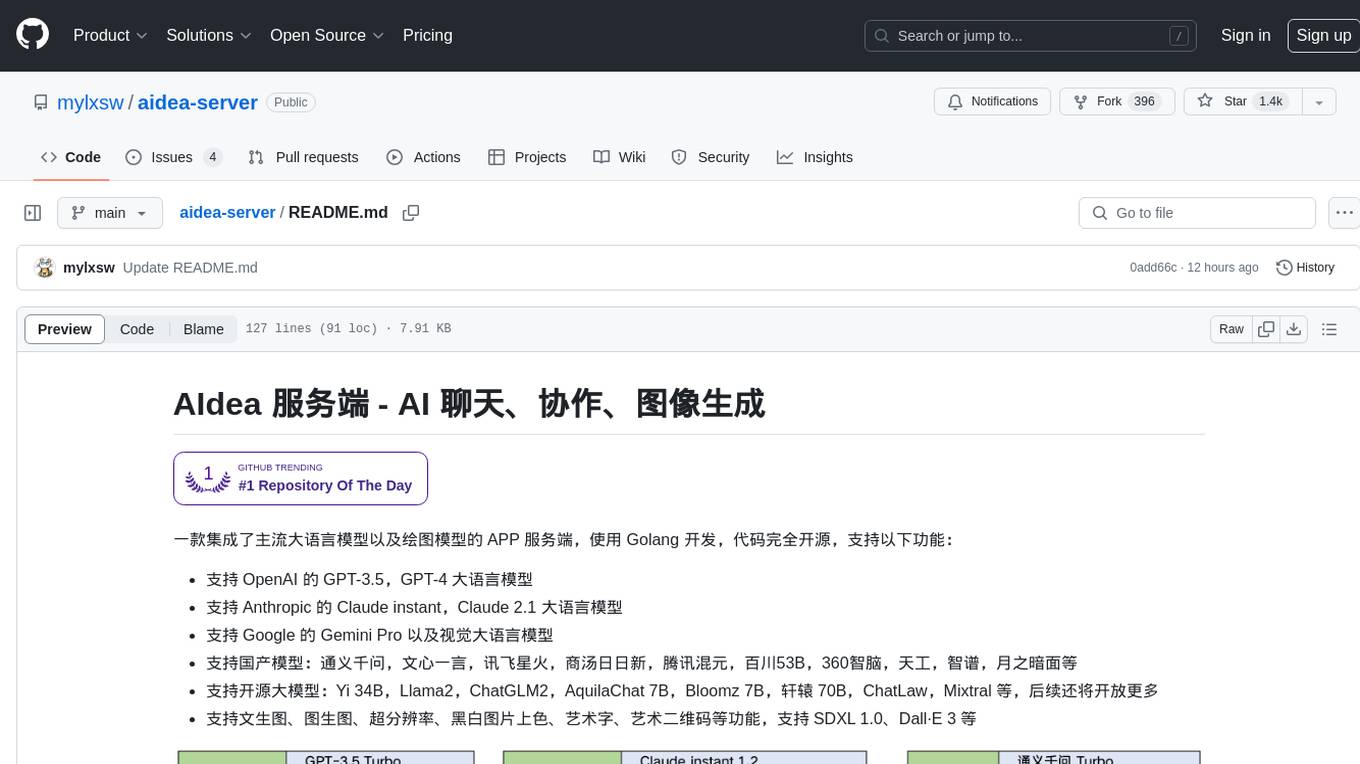
aidea-server
AIdea Server is an open-source Golang-based server that integrates mainstream large language models and drawing models. It supports various functionalities including OpenAI's GPT-3.5 and GPT-4, Anthropic's Claude instant and Claude 2.1, Google's Gemini Pro, as well as Chinese models like Tongyi Qianwen, Wenxin Yiyuan, and more. It also supports open-source large models like Yi 34B, Llama2, and AquilaChat 7B. Additionally, it provides features for text-to-image, super-resolution, coloring black and white images, generating art fonts and QR codes, among others.
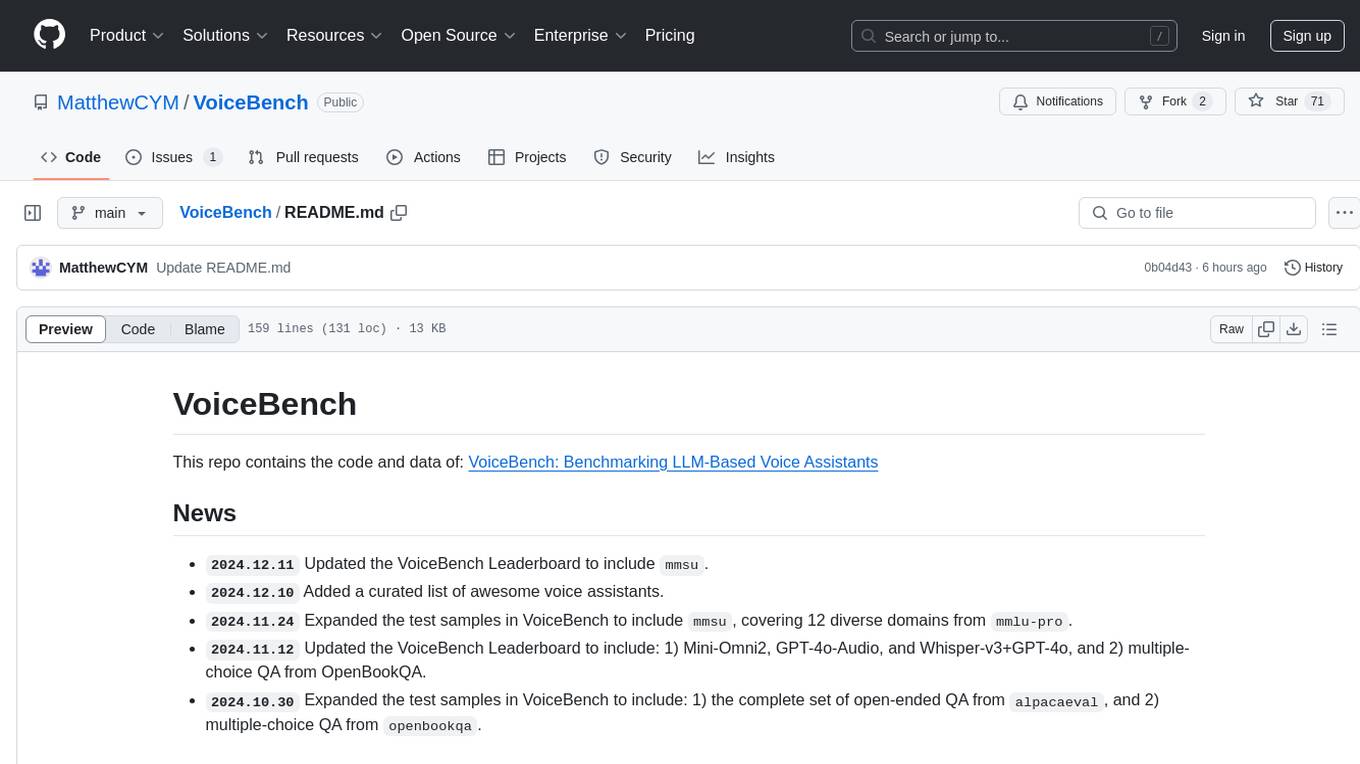
VoiceBench
VoiceBench is a repository containing code and data for benchmarking LLM-Based Voice Assistants. It includes a leaderboard with rankings of various voice assistant models based on different evaluation metrics. The repository provides setup instructions, datasets, evaluation procedures, and a curated list of awesome voice assistants. Users can submit new voice assistant results through the issue tracker for updates on the ranking list.
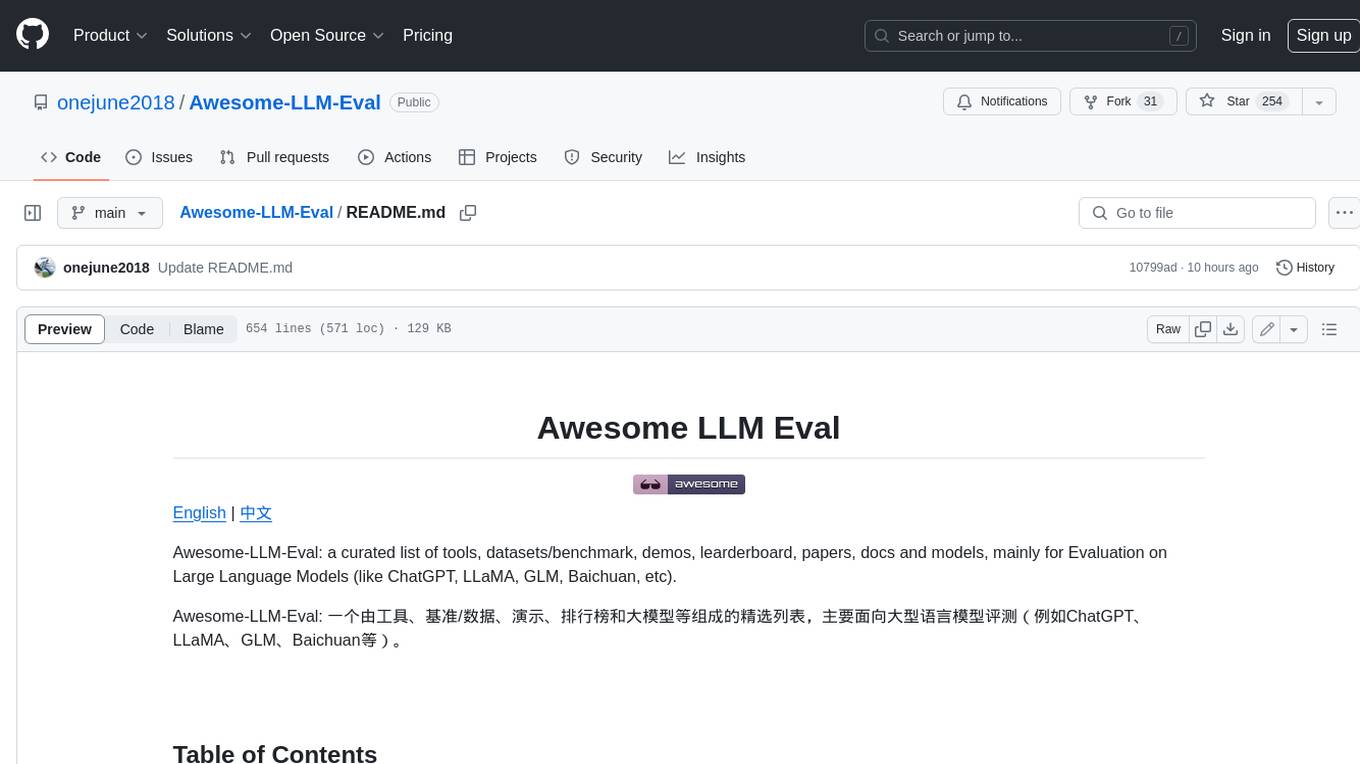
Awesome-LLM-Eval
Awesome-LLM-Eval: a curated list of tools, benchmarks, demos, papers for Large Language Models (like ChatGPT, LLaMA, GLM, Baichuan, etc) Evaluation on Language capabilities, Knowledge, Reasoning, Fairness and Safety.
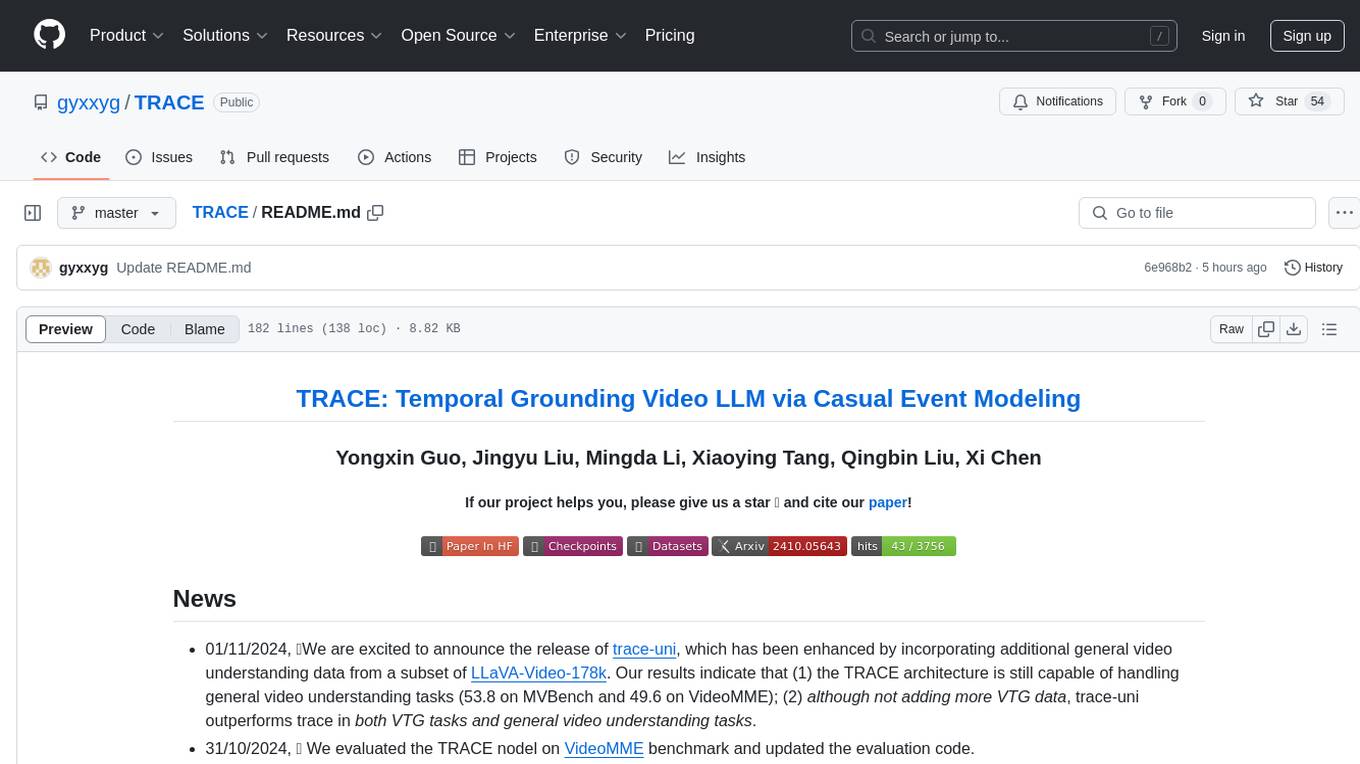
TRACE
TRACE is a temporal grounding video model that utilizes causal event modeling to capture videos' inherent structure. It presents a task-interleaved video LLM model tailored for sequential encoding/decoding of timestamps, salient scores, and textual captions. The project includes various model checkpoints for different stages and fine-tuning on specific datasets. It provides evaluation codes for different tasks like VTG, MVBench, and VideoMME. The repository also offers annotation files and links to raw videos preparation projects. Users can train the model on different tasks and evaluate the performance based on metrics like CIDER, METEOR, SODA_c, F1, mAP, Hit@1, etc. TRACE has been enhanced with trace-retrieval and trace-uni models, showing improved performance on dense video captioning and general video understanding tasks.
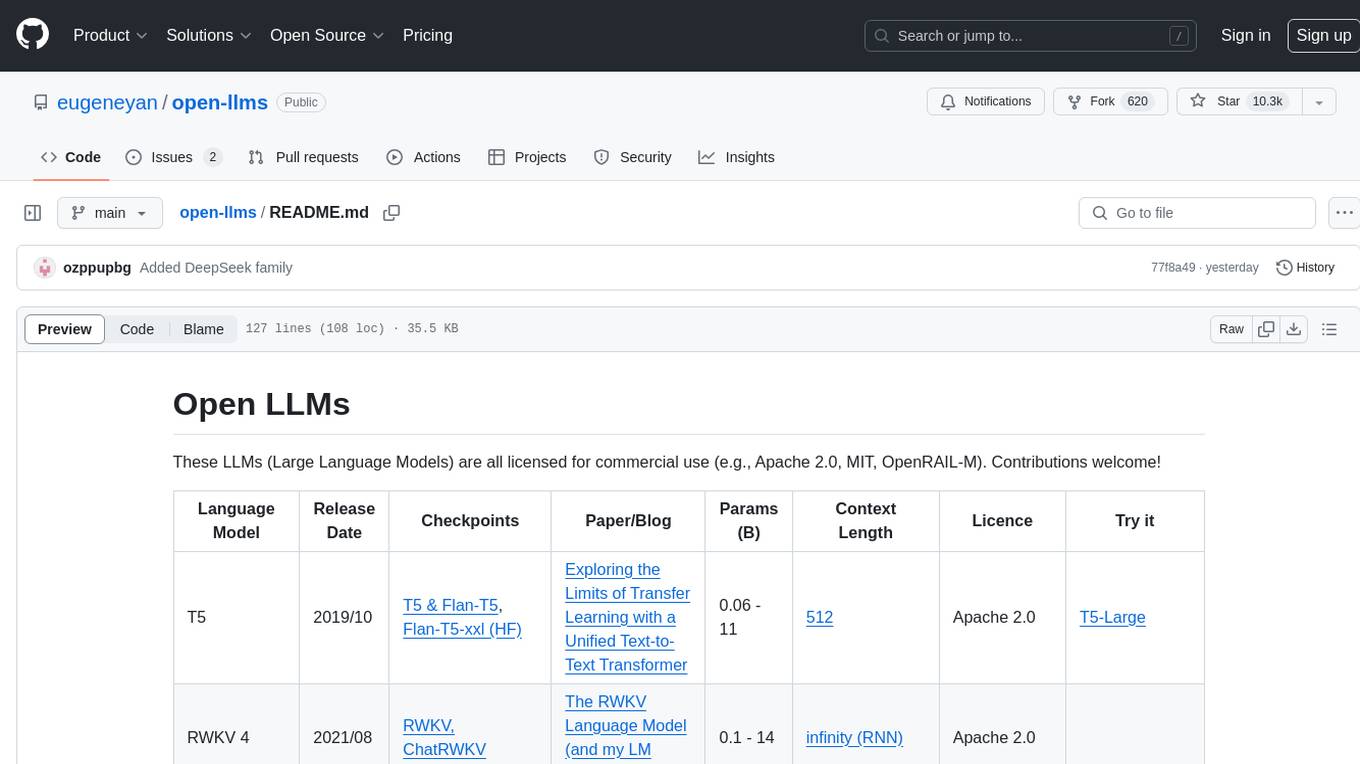
open-llms
Open LLMs is a repository containing various Large Language Models licensed for commercial use. It includes models like T5, GPT-NeoX, UL2, Bloom, Cerebras-GPT, Pythia, Dolly, and more. These models are designed for tasks such as transfer learning, language understanding, chatbot development, code generation, and more. The repository provides information on release dates, checkpoints, papers/blogs, parameters, context length, and licenses for each model. Contributions to the repository are welcome, and it serves as a resource for exploring the capabilities of different language models.
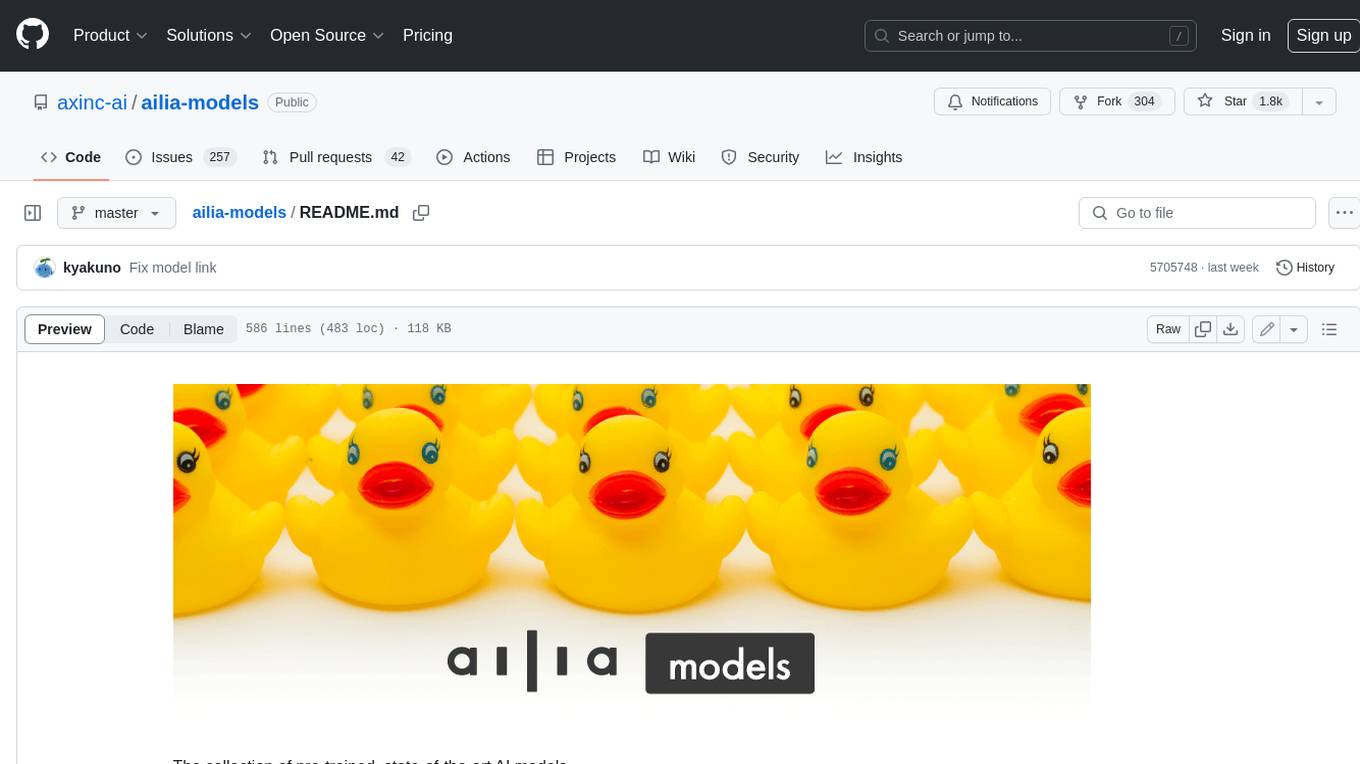
ailia-models
The collection of pre-trained, state-of-the-art AI models. ailia SDK is a self-contained, cross-platform, high-speed inference SDK for AI. The ailia SDK provides a consistent C++ API across Windows, Mac, Linux, iOS, Android, Jetson, and Raspberry Pi platforms. It also supports Unity (C#), Python, Rust, Flutter(Dart) and JNI for efficient AI implementation. The ailia SDK makes extensive use of the GPU through Vulkan and Metal to enable accelerated computing. # Supported models 323 models as of April 8th, 2024
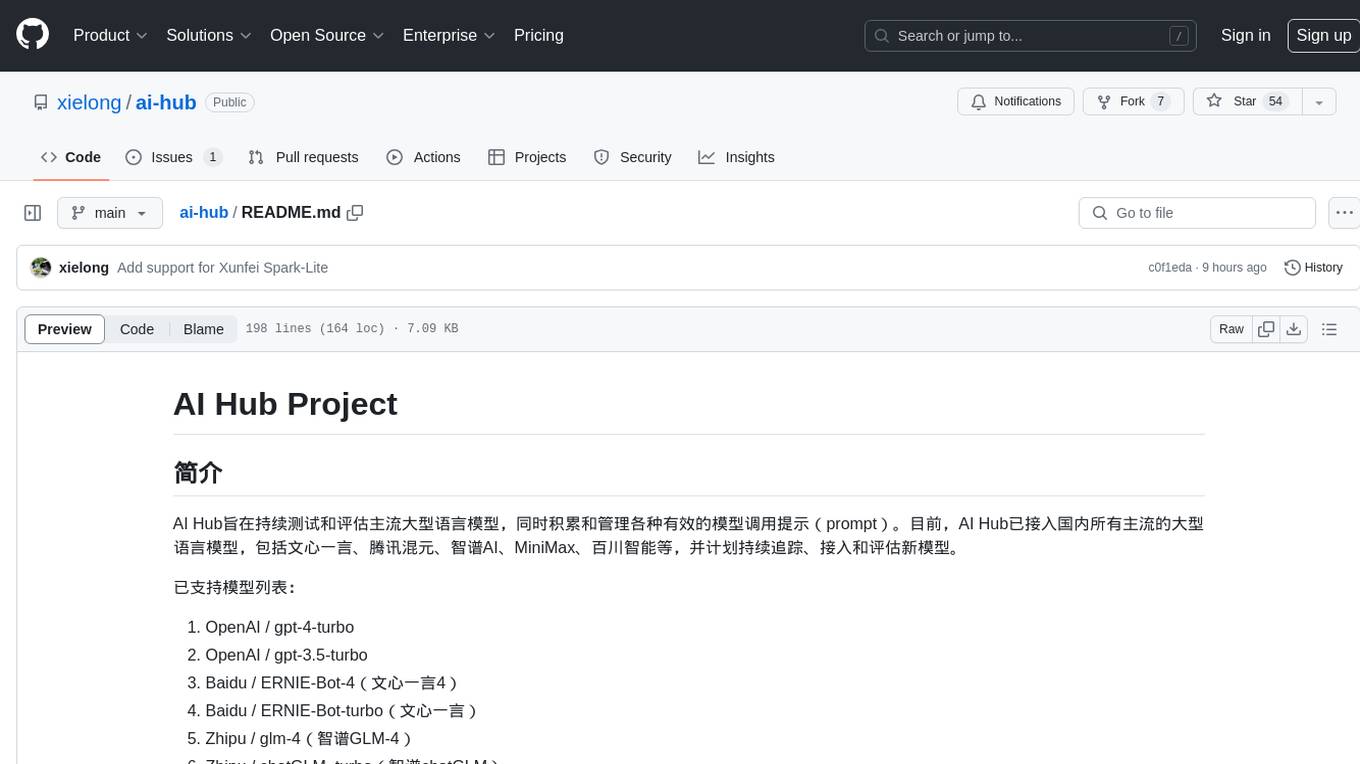
ai-hub
AI Hub Project aims to continuously test and evaluate mainstream large language models, while accumulating and managing various effective model invocation prompts. It has integrated all mainstream large language models in China, including OpenAI GPT-4 Turbo, Baidu ERNIE-Bot-4, Tencent ChatPro, MiniMax abab5.5-chat, and more. The project plans to continuously track, integrate, and evaluate new models. Users can access the models through REST services or Java code integration. The project also provides a testing suite for translation, coding, and benchmark testing.
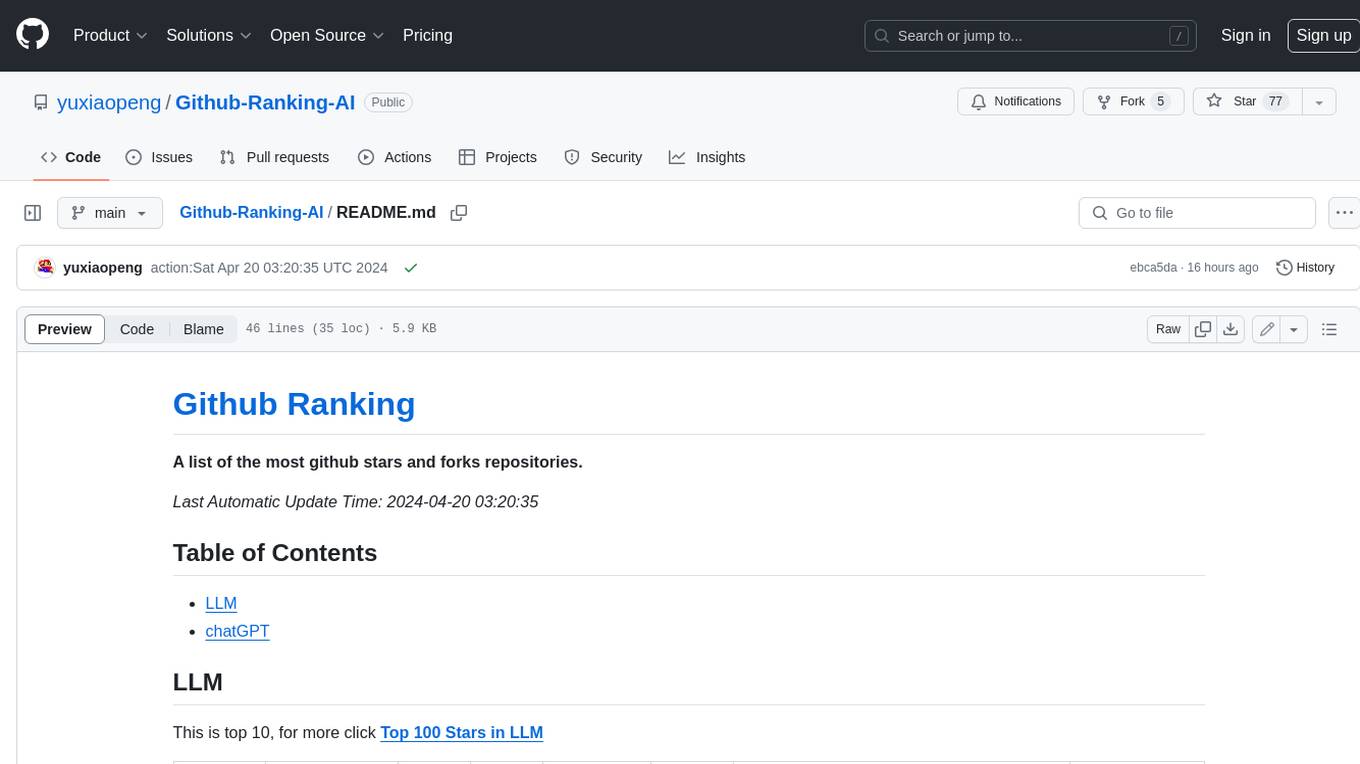
Github-Ranking-AI
This repository provides a list of the most starred and forked repositories on GitHub. It is updated automatically and includes information such as the project name, number of stars, number of forks, language, number of open issues, description, and last commit date. The repository is divided into two sections: LLM and chatGPT. The LLM section includes repositories related to large language models, while the chatGPT section includes repositories related to the chatGPT chatbot.
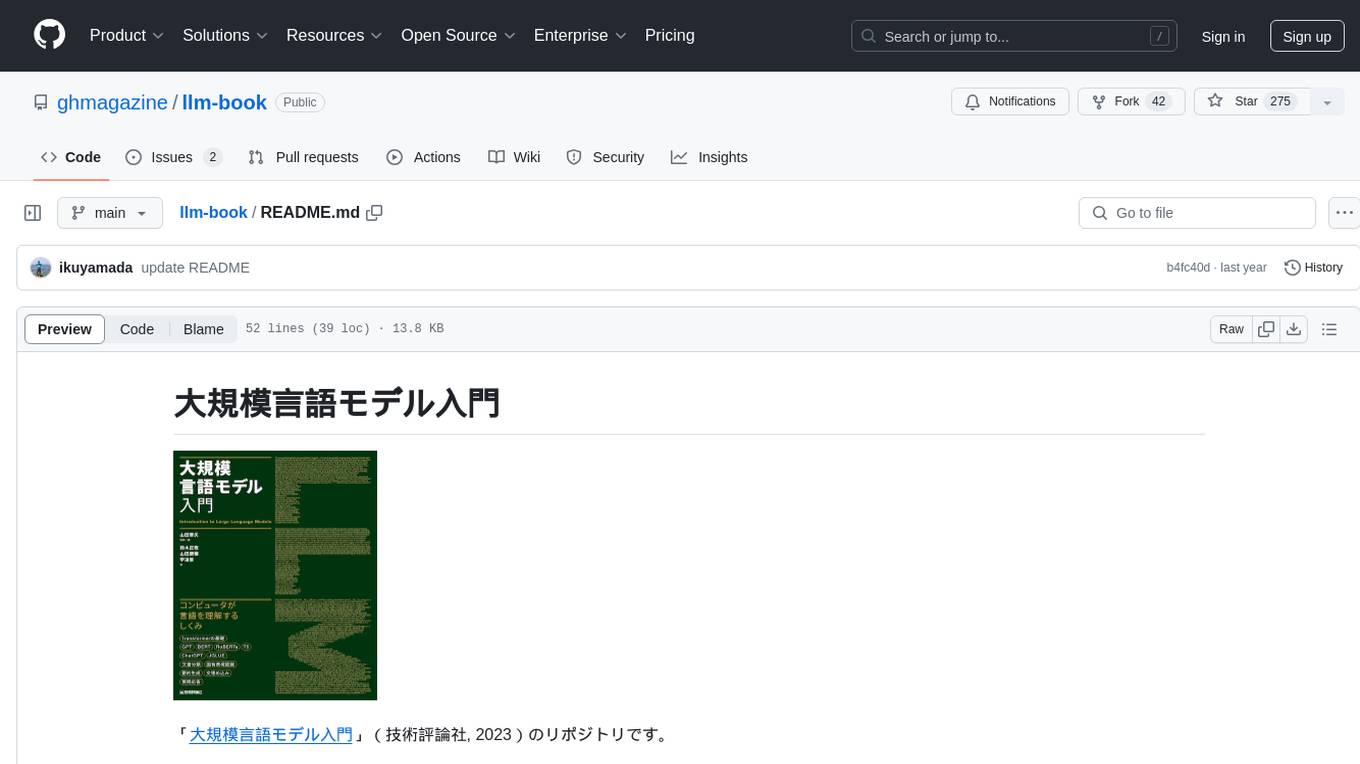
llm-book
The 'llm-book' repository is dedicated to the introduction of large-scale language models, focusing on natural language processing tasks. The code is designed to run on Google Colaboratory and utilizes datasets and models available on the Hugging Face Hub. Note that as of July 28, 2023, there are issues with the MARC-ja dataset links, but an alternative notebook using the WRIME Japanese sentiment analysis dataset has been added. The repository covers various chapters on topics such as Transformers, fine-tuning language models, entity recognition, summarization, document embedding, question answering, and more.
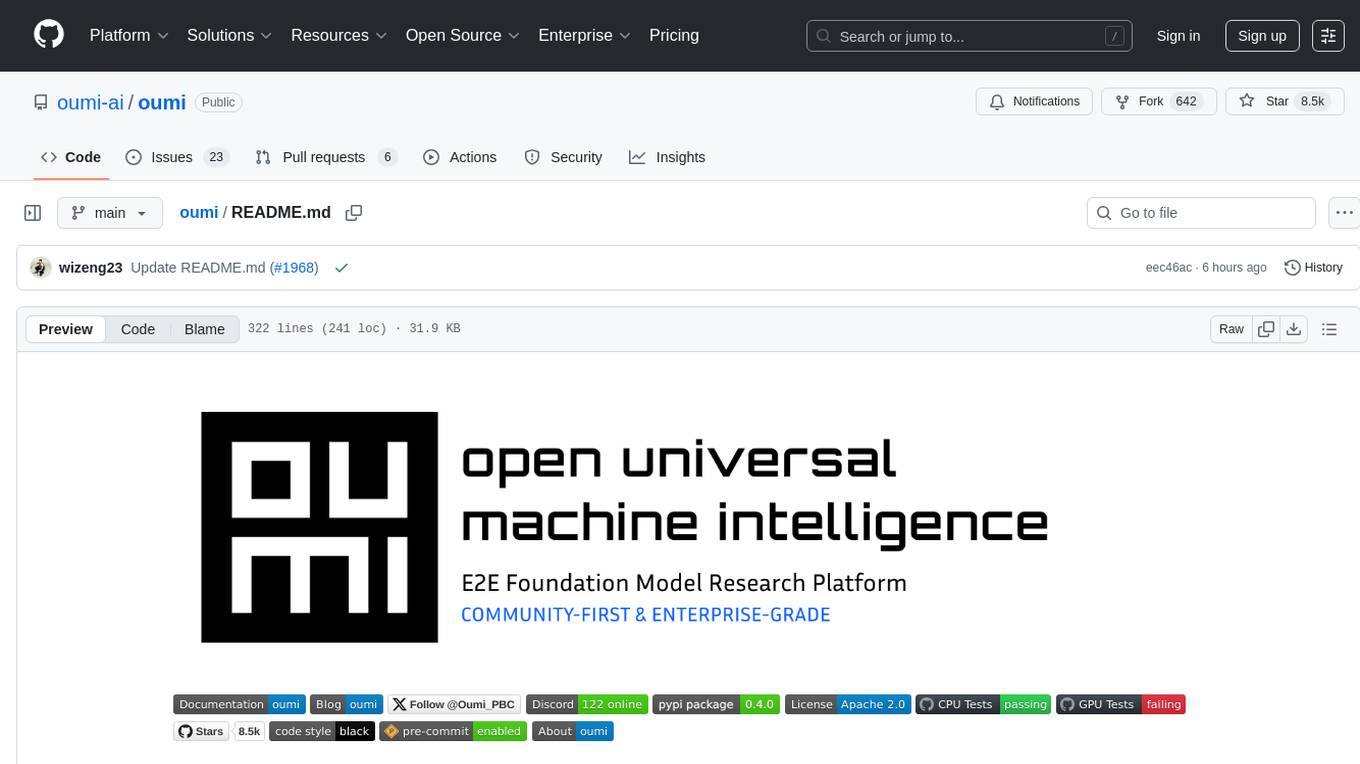
oumi
Oumi is an open-source platform for building state-of-the-art foundation models, offering tools for data preparation, training, evaluation, and deployment. It supports training and fine-tuning models with various parameters, working with text and multimodal models, synthesizing and curating training data, deploying models efficiently, evaluating models comprehensively, and running on different platforms. Oumi provides a consistent API, reliability, and flexibility for research purposes.
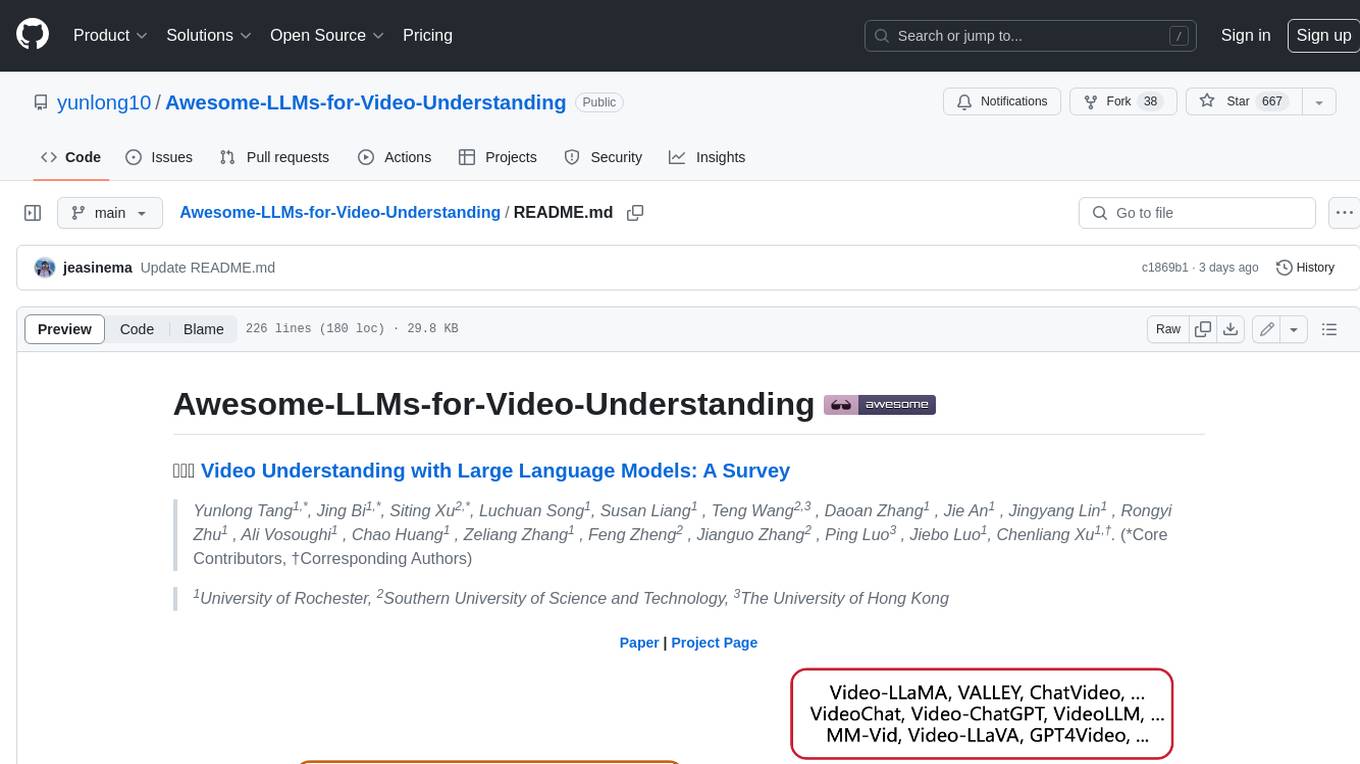
Awesome-LLMs-for-Video-Understanding
Awesome-LLMs-for-Video-Understanding is a repository dedicated to exploring Video Understanding with Large Language Models. It provides a comprehensive survey of the field, covering models, pretraining, instruction tuning, and hybrid methods. The repository also includes information on tasks, datasets, and benchmarks related to video understanding. Contributors are encouraged to add new papers, projects, and materials to enhance the repository.
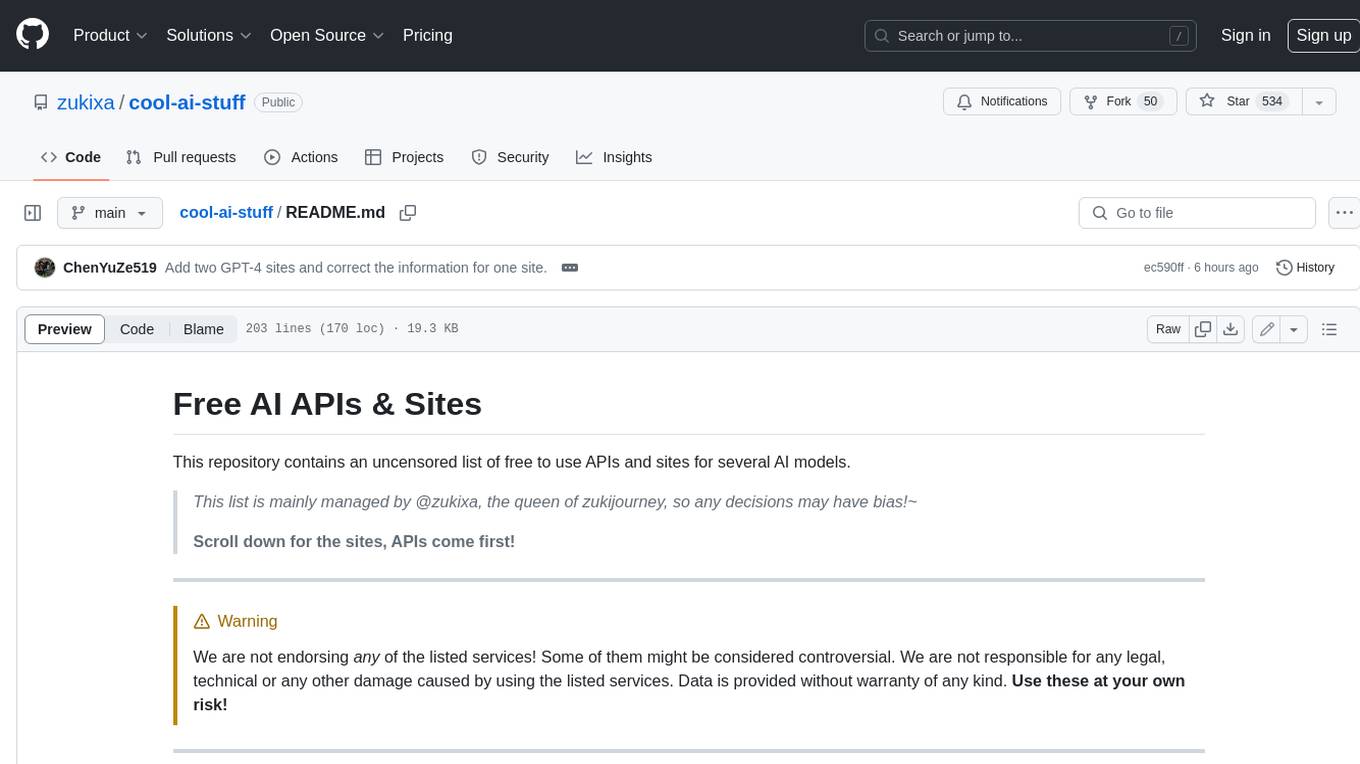
cool-ai-stuff
This repository contains an uncensored list of free to use APIs and sites for several AI models. > _This list is mainly managed by @zukixa, the queen of zukijourney, so any decisions may have bias!~_ > > **Scroll down for the sites, APIs come first!** * * * > [!WARNING] > We are not endorsing _any_ of the listed services! Some of them might be considered controversial. We are not responsible for any legal, technical or any other damage caused by using the listed services. Data is provided without warranty of any kind. **Use these at your own risk!** * * * # APIs Table of Contents #### Overview of Existing APIs #### Overview of Existing APIs -- Top LLM Models Available #### Overview of Existing APIs -- Top Image Models Available #### Overview of Existing APIs -- Top Other Features & Models Available #### Overview of Existing APIs -- Available Donator Perks * * * ## API List:* *: This list solely covers all providers I (@zukixa) was able to collect metrics in. Any mistakes are not my responsibility, as I am either banned, or not aware of x API. \ 1: Last Updated 4/14/24 ### Overview of APIs: | Service | # of Users1 | Link | Stablity | NSFW Ok? | Open Source? | Owner(s) | Other Notes | | ----------- | ---------- | ------------------------------------------ | ------------------------------------------ | --------------------------- | ------------------------------------------------------ | -------------------------- | ----------------------------------------------------------------------------------------------------------- | | zukijourney| 4441 | D | High | On /unf/, not /v1/ | ✅, Here | @zukixa | Largest & Oldest GPT-4 API still continuously around. Offers other popular AI-related Bots too. | | Hyzenberg| 1234 | D | High | Forbidden | ❌ | @thatlukinhasguy & @voidiii | Experimental sister API to Zukijourney. Successor to HentAI | | NagaAI | 2883 | D | High | Forbidden | ❌ | @zentixua | Honorary successor to ChimeraGPT, the largest API in history (15k users). | | WebRaftAI | 993 | D | High | Forbidden | ❌ | @ds_gamer | Largest API by model count. Provides a lot of service/hosting related stuff too. | | KrakenAI | 388 | D | High | Discouraged | ❌ | @paninico | It is an API of all time. | | ShuttleAI | 3585 | D | Medium | Generally Permitted | ❌ | @xtristan | Faked GPT-4 Before 1, 2 | | Mandrill | 931 | D | Medium | Enterprise-Tier-Only | ❌ | @fredipy | DALL-E-3 access pioneering API. Has some issues with speed & stability nowadays. | oxygen | 742 | D | Medium | Donator-Only | ❌ | @thesketchubuser | Bri'ish 🤮 & Fren'sh 🤮 | | Skailar | 399 | D | Medium | Forbidden | ❌ | @aquadraws | Service is the personification of the word 'feature creep'. Lots of things announced, not much operational. |
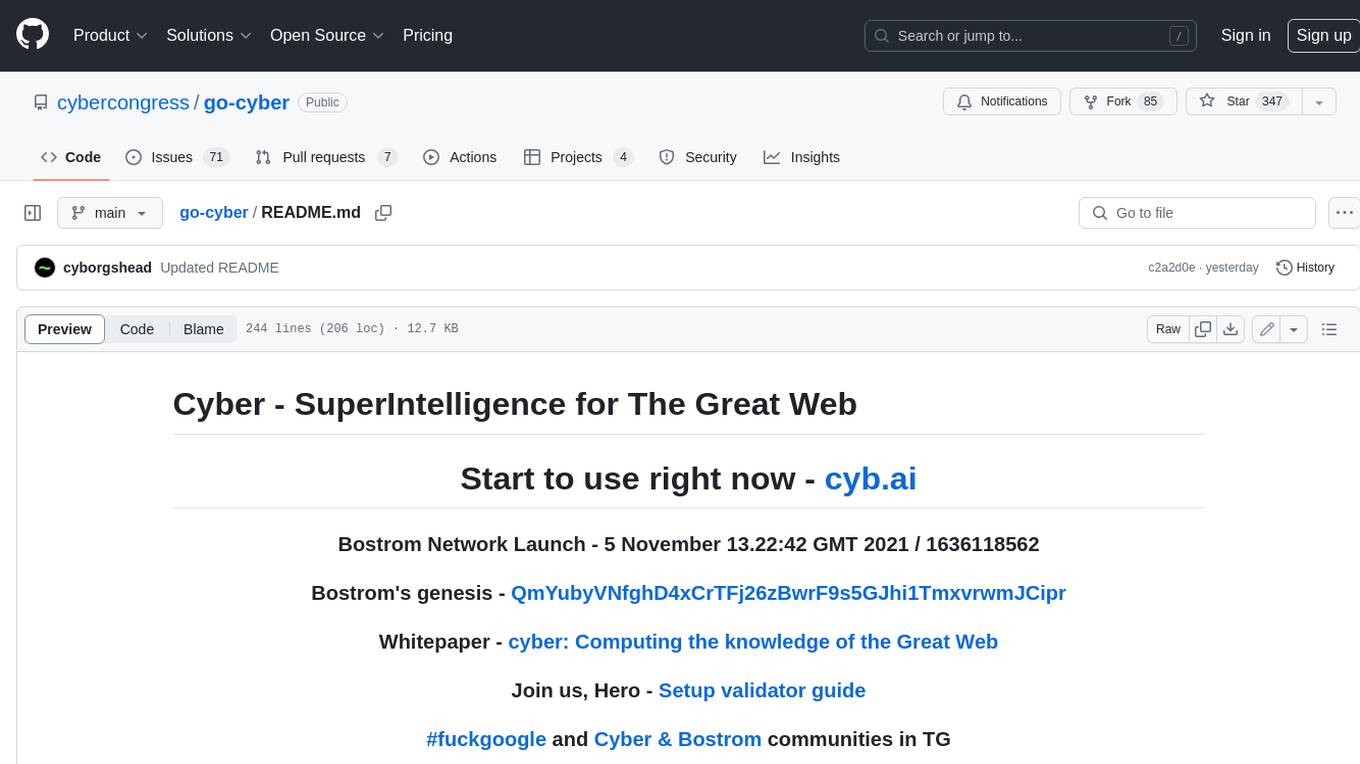
go-cyber
Cyber is a superintelligence protocol that aims to create a decentralized and censorship-resistant internet. It uses a novel consensus mechanism called CometBFT and a knowledge graph to store and process information. Cyber is designed to be scalable, secure, and efficient, and it has the potential to revolutionize the way we interact with the internet.
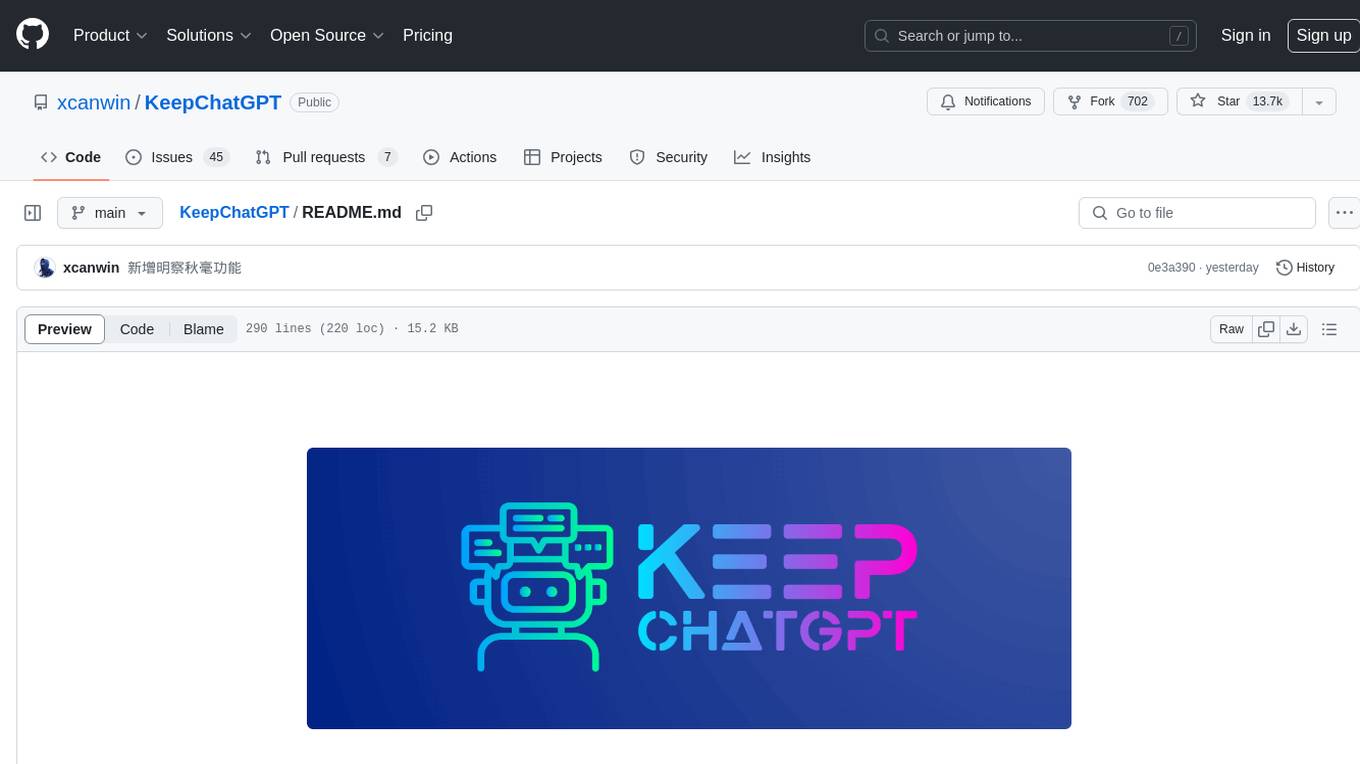
KeepChatGPT
KeepChatGPT is a plugin designed to enhance the data security capabilities and efficiency of ChatGPT. It aims to make your chat experience incredibly smooth, eliminating dozens or even hundreds of unnecessary steps, and permanently getting rid of various errors and warnings. It offers innovative features such as automatic refresh, activity maintenance, data security, audit cancellation, conversation cloning, endless conversations, page purification, large screen display, full screen display, tracking interception, rapid changes, and detailed insights. The plugin ensures that your AI experience is secure, smooth, efficient, concise, and seamless.
For similar tasks

LLamaTuner
LLamaTuner is a repository for the Efficient Finetuning of Quantized LLMs project, focusing on building and sharing instruction-following Chinese baichuan-7b/LLaMA/Pythia/GLM model tuning methods. The project enables training on a single Nvidia RTX-2080TI and RTX-3090 for multi-round chatbot training. It utilizes bitsandbytes for quantization and is integrated with Huggingface's PEFT and transformers libraries. The repository supports various models, training approaches, and datasets for supervised fine-tuning, LoRA, QLoRA, and more. It also provides tools for data preprocessing and offers models in the Hugging Face model hub for inference and finetuning. The project is licensed under Apache 2.0 and acknowledges contributions from various open-source contributors.
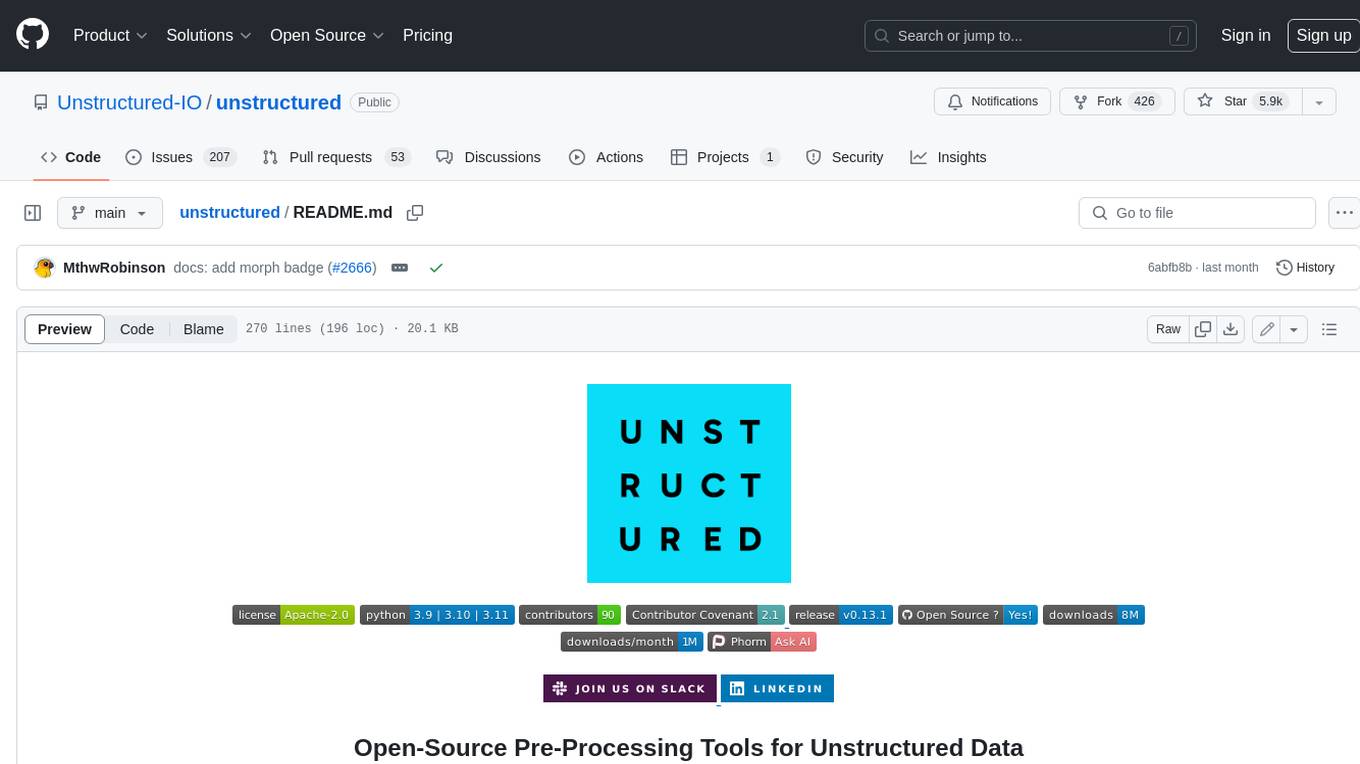
unstructured
The `unstructured` library provides open-source components for ingesting and pre-processing images and text documents, such as PDFs, HTML, Word docs, and many more. The use cases of `unstructured` revolve around streamlining and optimizing the data processing workflow for LLMs. `unstructured` modular functions and connectors form a cohesive system that simplifies data ingestion and pre-processing, making it adaptable to different platforms and efficient in transforming unstructured data into structured outputs.
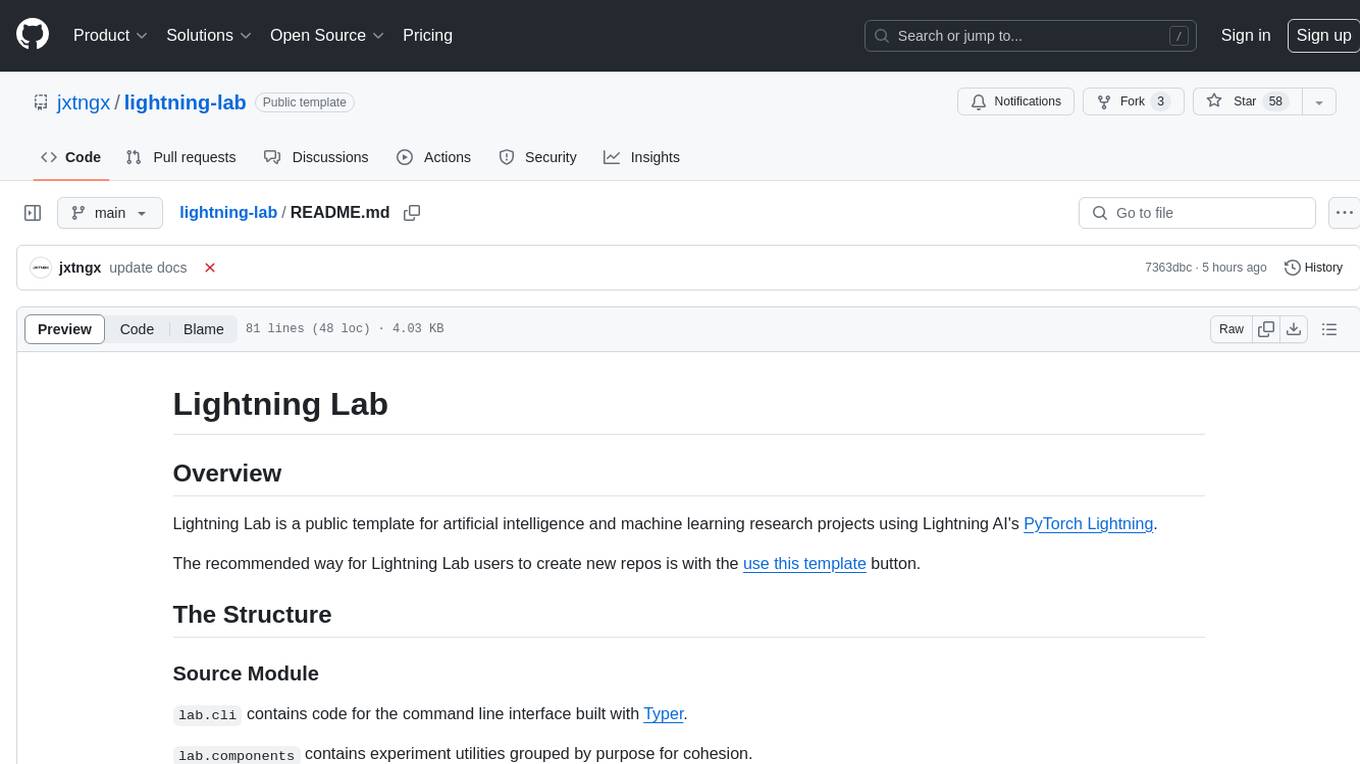
lightning-lab
Lightning Lab is a public template for artificial intelligence and machine learning research projects using Lightning AI's PyTorch Lightning. It provides a structured project layout with modules for command line interface, experiment utilities, Lightning Module and Trainer, data acquisition and preprocessing, model serving APIs, project configurations, training checkpoints, technical documentation, logs, notebooks for data analysis, requirements management, testing, and packaging. The template simplifies the setup of deep learning projects and offers extras for different domains like vision, text, audio, reinforcement learning, and forecasting.
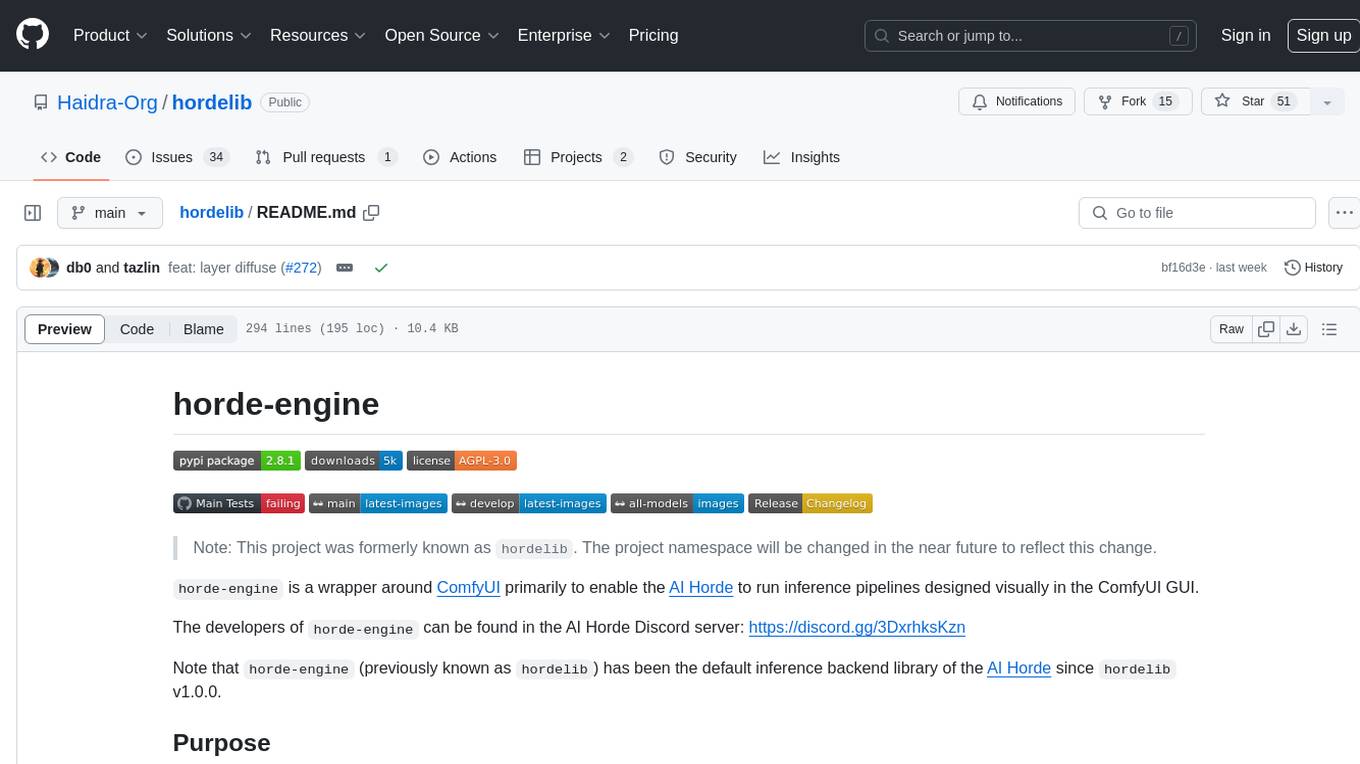
hordelib
horde-engine is a wrapper around ComfyUI designed to run inference pipelines visually designed in the ComfyUI GUI. It enables users to design inference pipelines in ComfyUI and then call them programmatically, maintaining compatibility with the existing horde implementation. The library provides features for processing Horde payloads, initializing the library, downloading and validating models, and generating images based on input data. It also includes custom nodes for preprocessing and tasks such as face restoration and QR code generation. The project depends on various open source projects and bundles some dependencies within the library itself. Users can design ComfyUI pipelines, convert them to the backend format, and run them using the run_image_pipeline() method in hordelib.comfy.Comfy(). The project is actively developed and tested using git, tox, and a specific model directory structure.
BizyAir
BizyAir is a collection of ComfyUI nodes that help users overcome environmental and hardware limitations to generate high-quality content. It includes features such as ControlNet preprocessing, image background removal, photo-quality image generation, and animation super-resolution. Users can run ComfyUI anywhere without worrying about hardware requirements. Installation methods include using ComfyUI Manager, Comfy CLI, downloading standalone packages for Windows, or cloning the BizyAir repository into the custom_nodes subdirectory of ComfyUI.
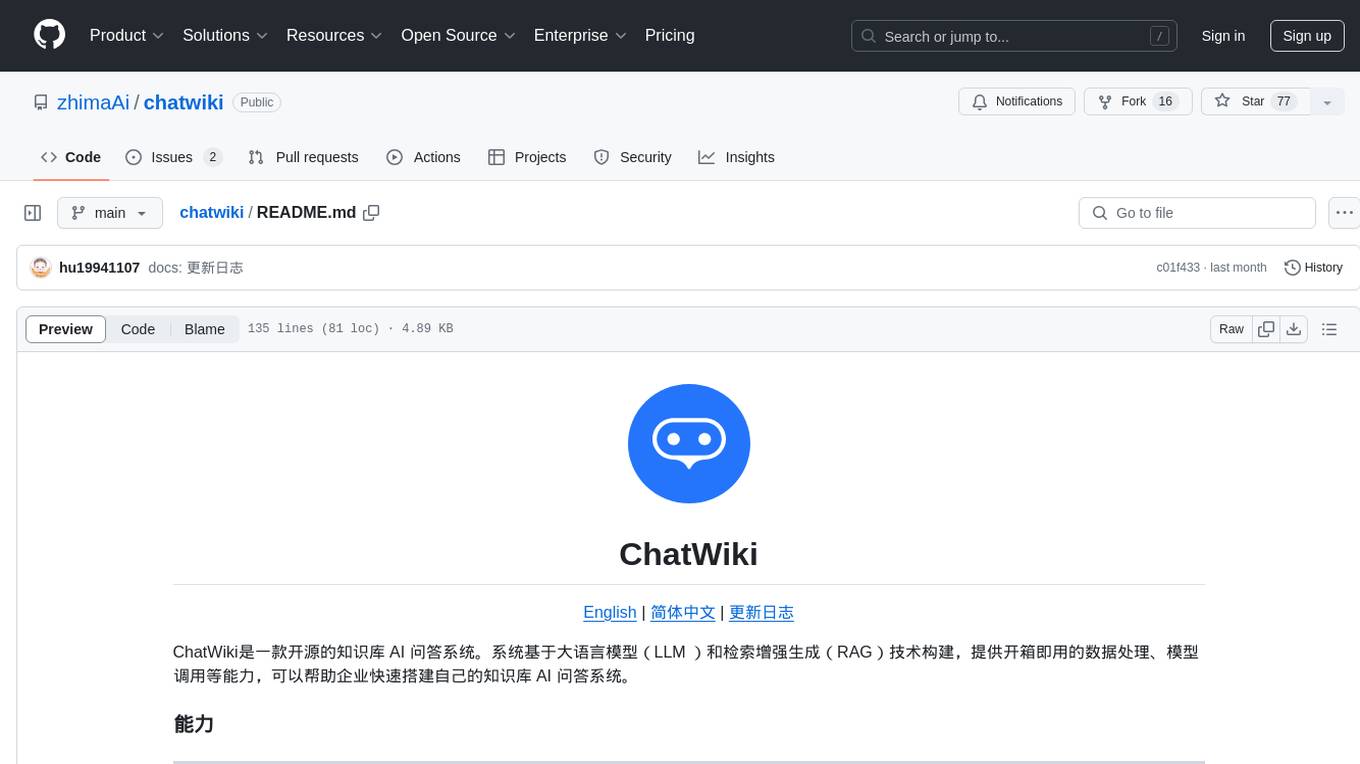
chatwiki
ChatWiki is an open-source knowledge base AI question-answering system. It is built on large language models (LLM) and retrieval-augmented generation (RAG) technologies, providing out-of-the-box data processing, model invocation capabilities, and helping enterprises quickly build their own knowledge base AI question-answering systems. It offers exclusive AI question-answering system, easy integration of models, data preprocessing, simple user interface design, and adaptability to different business scenarios.
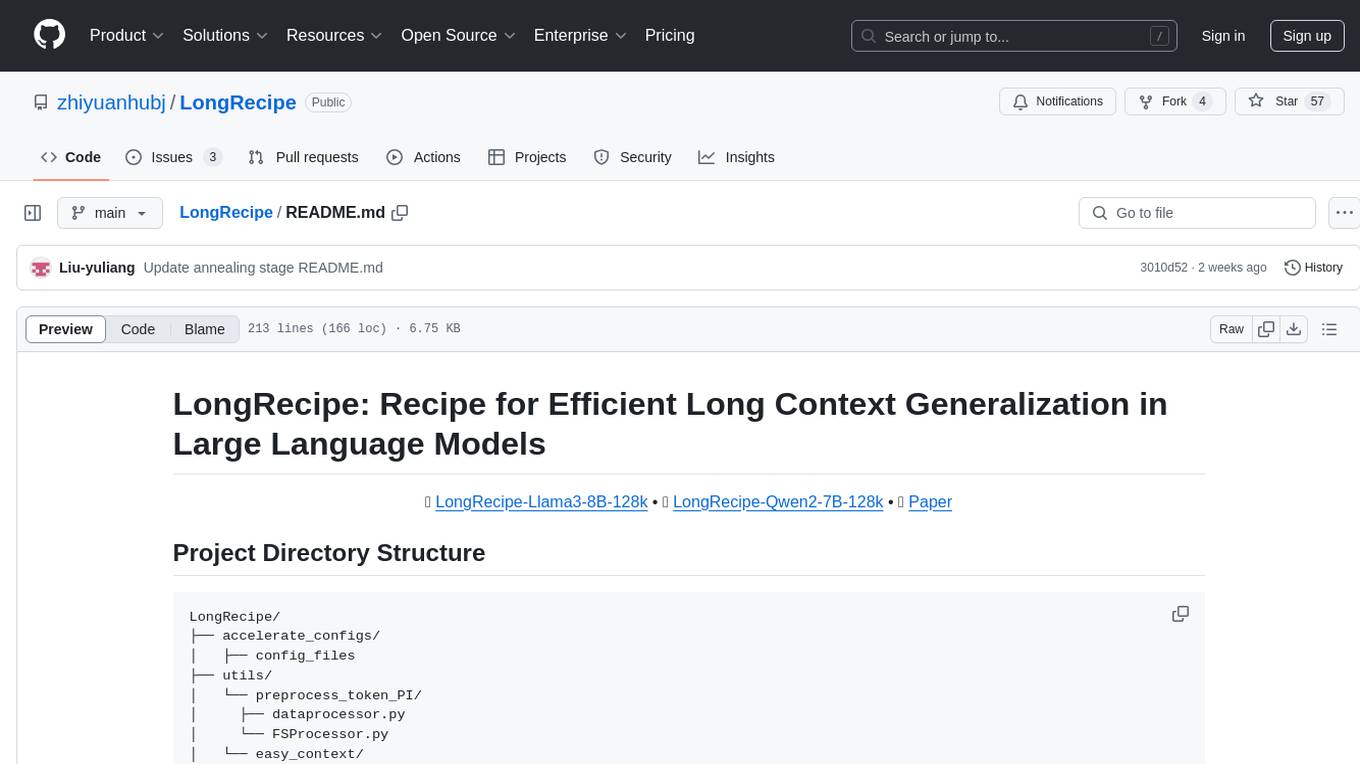
LongRecipe
LongRecipe is a tool designed for efficient long context generalization in large language models. It provides a recipe for extending the context window of language models while maintaining their original capabilities. The tool includes data preprocessing steps, model training stages, and a process for merging fine-tuned models to enhance foundational capabilities. Users can follow the provided commands and scripts to preprocess data, train models in multiple stages, and merge models effectively.
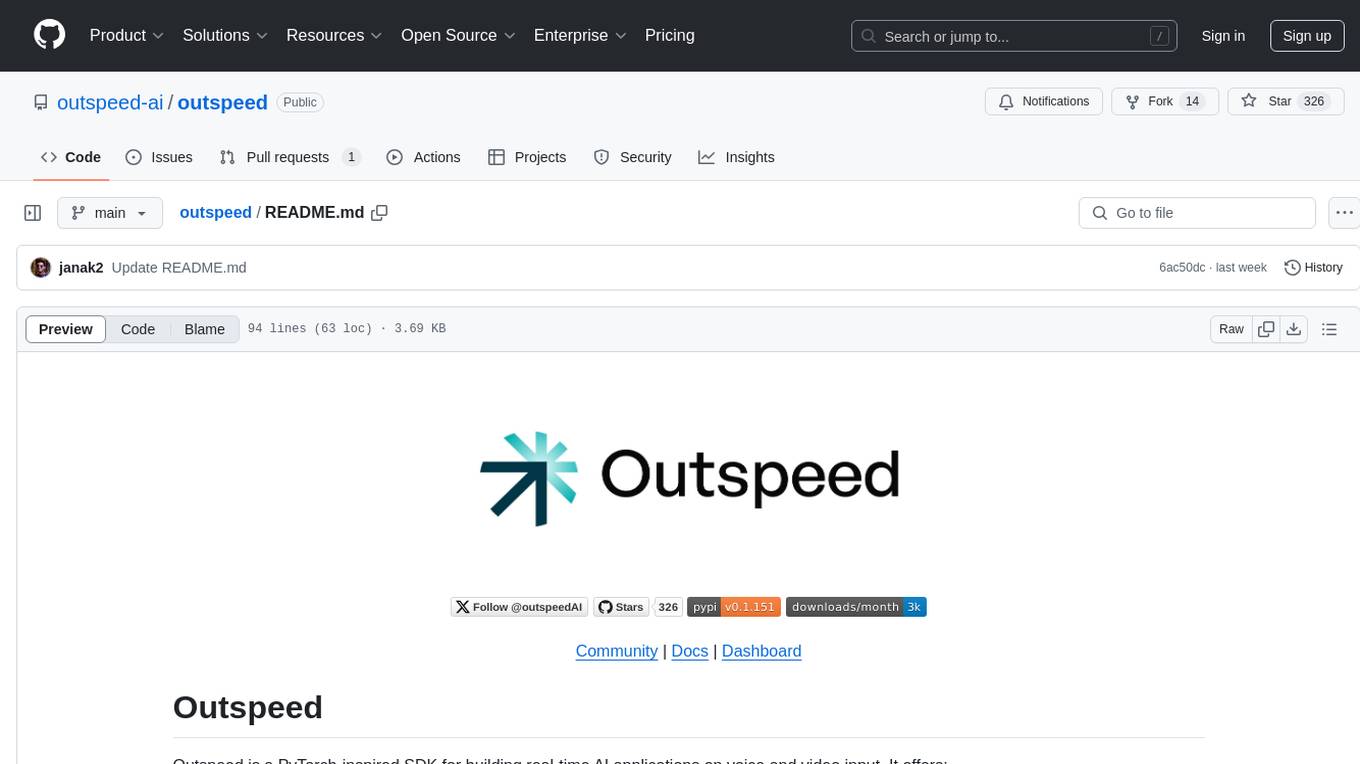
outspeed
Outspeed is a PyTorch-inspired SDK for building real-time AI applications on voice and video input. It offers low-latency processing of streaming audio and video, an intuitive API familiar to PyTorch users, flexible integration of custom AI models, and tools for data preprocessing and model deployment. Ideal for developing voice assistants, video analytics, and other real-time AI applications processing audio-visual data.
For similar jobs

weave
Weave is a toolkit for developing Generative AI applications, built by Weights & Biases. With Weave, you can log and debug language model inputs, outputs, and traces; build rigorous, apples-to-apples evaluations for language model use cases; and organize all the information generated across the LLM workflow, from experimentation to evaluations to production. Weave aims to bring rigor, best-practices, and composability to the inherently experimental process of developing Generative AI software, without introducing cognitive overhead.

LLMStack
LLMStack is a no-code platform for building generative AI agents, workflows, and chatbots. It allows users to connect their own data, internal tools, and GPT-powered models without any coding experience. LLMStack can be deployed to the cloud or on-premise and can be accessed via HTTP API or triggered from Slack or Discord.

VisionCraft
The VisionCraft API is a free API for using over 100 different AI models. From images to sound.

kaito
Kaito is an operator that automates the AI/ML inference model deployment in a Kubernetes cluster. It manages large model files using container images, avoids tuning deployment parameters to fit GPU hardware by providing preset configurations, auto-provisions GPU nodes based on model requirements, and hosts large model images in the public Microsoft Container Registry (MCR) if the license allows. Using Kaito, the workflow of onboarding large AI inference models in Kubernetes is largely simplified.

PyRIT
PyRIT is an open access automation framework designed to empower security professionals and ML engineers to red team foundation models and their applications. It automates AI Red Teaming tasks to allow operators to focus on more complicated and time-consuming tasks and can also identify security harms such as misuse (e.g., malware generation, jailbreaking), and privacy harms (e.g., identity theft). The goal is to allow researchers to have a baseline of how well their model and entire inference pipeline is doing against different harm categories and to be able to compare that baseline to future iterations of their model. This allows them to have empirical data on how well their model is doing today, and detect any degradation of performance based on future improvements.

tabby
Tabby is a self-hosted AI coding assistant, offering an open-source and on-premises alternative to GitHub Copilot. It boasts several key features: * Self-contained, with no need for a DBMS or cloud service. * OpenAPI interface, easy to integrate with existing infrastructure (e.g Cloud IDE). * Supports consumer-grade GPUs.

spear
SPEAR (Simulator for Photorealistic Embodied AI Research) is a powerful tool for training embodied agents. It features 300 unique virtual indoor environments with 2,566 unique rooms and 17,234 unique objects that can be manipulated individually. Each environment is designed by a professional artist and features detailed geometry, photorealistic materials, and a unique floor plan and object layout. SPEAR is implemented as Unreal Engine assets and provides an OpenAI Gym interface for interacting with the environments via Python.

Magick
Magick is a groundbreaking visual AIDE (Artificial Intelligence Development Environment) for no-code data pipelines and multimodal agents. Magick can connect to other services and comes with nodes and templates well-suited for intelligent agents, chatbots, complex reasoning systems and realistic characters.








